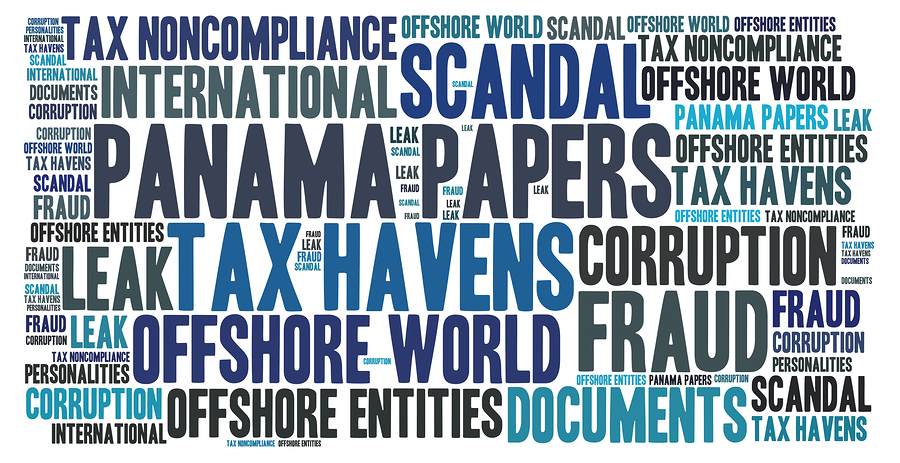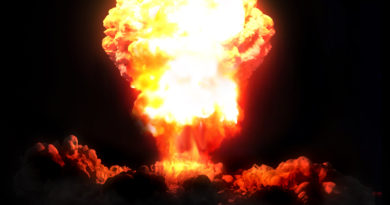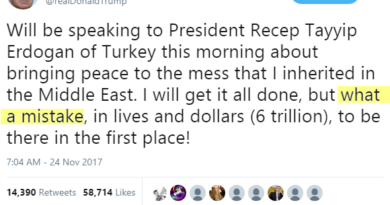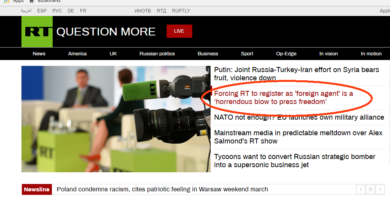3 Signs the Panama Papers Leak is a Government Operation
On the Monday following April Fool’s Day 2016, the world woke up to the Panama Papers leak plastered all over the mainstream news. The alt media quickly picked up on the cues of government propaganda and you might have, as well, if you’re one of the growing number of people waking up to the system of mass manipulation and control we live under. Here’s three things that I think are signs the Panama Papers leak is a government-controlled propaganda operation.
The First Sign: No American Leaders Implicated
The largest press leak in history concerns the hiding of assets in an off-shore tax haven, and yet no American politician or prominent business person is implicated. Seriously? That’s about as believable as the “magic bullet” theory from the Warren Commission Report on the Assassination of JFK. But, of course, the public isn’t allowed access to the raw data. Rather the public only gets access to what the reporters selected by the International Consortium of Investigative Journalists (ICIJ) deem worthy of public consumption.
This glaring fact might be explained away by the assertion of a cover up to protect powerful American interests. And this is also probably true, but it doesn’t seem to be the whole story when consider the other peculiarities about this leak discussed below. More insidiously, this explanation serves to divert and dissuade people from pursing the possibility that this whole leak has been prompted by those very same powerful American interests. A likelihood supported when you consider the other two signs that point to a U.S. government propaganda campaign.
Sign 2: Focus on Challengers of American Hegemonic Global Finance
The Panama Papers leak, at least that part which the ICIJ allows into the public sphere, as well as the main stream news stories on the leak seem to be primarily focused on three political targets, Russian President Vladimir Putin, Former Icelandic Prime Minister Sigmundur David Gunnlaugsson, and the Brazilian government. What do all three of these things have in common? They are all associated with serious challenges to the current global financial system and American hegemony in the last decade.
Russian President Vladimir Putin
Stock photos of Vladimir Putin continue to feature prominently in mainstream reporting of the Panama Papers scandal. But according to this very same reporting, Putin himself has not been directly implicated in the scandal. So it really doesn’t make a lot of sense to use a picture of Putin next to this story, unless, of course, somebody wants to just associate Putin with bad stuff. The good ol’ USA wouldn’t have any reason to do that, would it?
Hell yes, it would! Under Putin, Russia has challenged American hegemony and the banksters for which it stands time and time again. Most notably when Russia stepped into Syria late last year and not only quickly started kicking ISIS butt, but also effectively diffused a situation that very well could have set off World War III. Russia’s involvement in Syria ended up being a triple-whammy against U.S. interests when Russia also exposed the fact that the U.S., along with its regional allies Turkey and Saudi Arabia, created and have been supporting ISIS materially and financially the whole time.
But wait, there’s more. Russia is also a member of the BRICS group of nations which are developing alternatives to the petro-dollar world reserve currency standard and the current global banking system. And that may be the biggest no-no. This is a topic for another blog post, but suffice it to say that most of the countries the U.S. seems to be unfriendly with since 9/11 have also posed a real challenge to the petro-dollar standard and current global banking system. Most notably Iraq, Libya and, until recently, Iran.
Icelandic Prime Minister, Sigmundur David Gunnlaugsson
Sigmundur David Gunnlaugsson rose to prominence in Iceland on a wave of anti-banking sentiment after the 2008 global financial collapse caused by widespread banking fraud. Gunnlaugsson rode this wave right into becoming the youngest prime minister in Icelandic history. Iceland is the only country that let their “too big to fail” banks go under in the 2008 crisis and then actually held the fraudsters accountable by subjecting them to criminal prosecution. This is in stark contrast to the U.S. and the rest of the world bailing out their criminal bankers and letting these fraudsters not only walk free, but to use bailout money to pay obscene bonuses to reward criminal behavior.
Iceland is the one country whose government was unwilling to burden future generations to bailout the kleptocracy. Iceland not only survived letting these corrupt banks fail, but has done just fine economically since then. Thus, Iceland stood as a glowing testament to the fact that no bank is “too big to fail”. Typically this type of behavior would evoke a military response from Uncle Sam under some pretense of protecting human rights, but military action against Western European countries seems to also be a no-no in U.S. foreign policy.
So bringing down the government that put the banksters in jail through scandal is the next best thing. Not only has Gunnlaugsson been forced to resign, it seems Iceland’s success at beating the big banks is already being undone. See this story from RT , for example – “New Iceland law allows jailed bankers to walk free amid Panama Papers scandal“. The fact that Iceland snubbed the EU by withdrawing its application for EU membership in 2015 is just one more reason why it would be targeted by the banskters for “regime change”.
Brazil
The third name that is featuring prominently is the Brazilian government, which is already embroiled in scandal and facing massive civil unrest. Brazil had a harsh official reaction to the Edward Snowden NSA spying revelations in 2014. It has been cozy with two Latin American countries that have snubbed their noses at the United States, those being Cuba (before it was cool to be cozy with Cuba) and Venezuela. Now these two reasons alone really don’t seem serious enough threats to American hegemony for the U.S. to point the barrels of it’s propaganda machine in Brazil’s direction. But when considered along with the fact that Brazil is the “B” in the BRICS organization mentioned above, you have ample reason for Brazil to find itself in U.S. cross-hairs.
Sign 3: The ICIJ’s Release of Information is Selective
The ICIJ is a journalistic organization that most people never heard of before the the release of the Panama Papers. On it’s website, the ICIJ claims to be a non-profit that gives away its work for free and that one of its aims is the accountability of power. If the Panama Papers that were leaked to the ICIJ are so important to society and the ICIJ truly aims to hold power accountable, why not be transparent and release the whole thing out on the web for everyone to see?
The fact that ICIJ’s membership is made up of only a small, select number of journalists totaling less than two-hundred globally, who all appear to have ties to big mainstream media, belies its pronounced dedication to holding the powerful accountable. A look at the ICIJ’s sponsorship further calls into question the its stated high-minded goals. With sponsors like George Soros’ Open Society Foundations and the Ford Foundation, it is more likely just another propaganda tool of the establishment, rather than a true watchdog organization. After all, how can you investigate and hold accountable the powerful if you are beholden to them for your financing?
Bonus – Sign 4: Manipulating the Public to Demand Less Privacy
An additional sign that the Panama Papers leak is a government operation is the public outcry it has generated which is targeted at mechanisms that allow wealthy people and corporations to hide assets from government taxation. The fact that taxes, particularly income taxes, are oppressive, bad for the economy, and arguably unnecessary in our fiat-currency system is a discussion for another blog post. But suffice it to say, considering that most governments spend too much of their budget on killing and making the most criminal-minded individuals even more wealthy, there is ample reason to seek to shelter one’s wealth from government coffers. Panama has just been capitalizing on this need.
On the other hand, using the media to get the public to cry out for action to prevent people and corporations from hiding assets not only helps reaffirm the invasive U.S. surveillance state, but provides a reason to continue expanding that surveillance state beyond our borders. This also explains why British Prime Minister, David Cameron, also seems to be a target of the Panama Papers press coverage despite being a close U.S. and big bank ally. Like Putin, Cameron hasn’t been directly implicated of any supposed wrong-doing either, however he has taken the lead for calls for more transparency and the sharing of financial information between financial institutions and governments.
This is a perfect Hegelian Dialectic/problem-reaction-solution scenario to expand the police state. Start with the media fostered scandal over the rich and powerful hiding assets in offshore entities to avoid taxation (something people have known about for quite some time). This stirs calls for action to stop the practice and make these people pay their “fair share” of taxes. This, in turn, will be used to not only limit the ability of people to hide assets from heavily indebted and obviously mismanaged governments, but will also create another opportunity to expand the growing surveillance state worldwide. Ultimately, the privacy and rights of regular citizens will become ensnared in these changes. And there you have Bonus Reason 4 to create this crisis.
@PoliticalNews4u | Facebook/PoliticalNewsReport | Google+/PoliticalNewsReport
Thanks to The Corbett Report for pointing out the sponsorship of the ICIJ. Please see his video here: “What I Learned From the Panama Papers“.
Panama Papers word cloud illustration photo from Big Stock Photo




